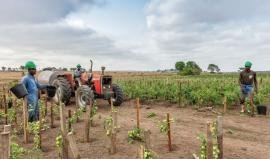Government is implementing comprehensive measures to support small-scale farmers, especially in rural and underdeveloped provinces like the Eastern Cape, Limpopo, and KwaZulu-Natal.
This is according to Deputy President Paul Mashatile who outlined key strategies during a parliamentary question-and-answer session. At Thursday’s session, the Deputy President emphasised the importance of enhancing agricultural productivity and improving access to funding.
Addressing the National Assembly, he stated that the government is improving agricultural productivity through the Agriculture Agro-Processing Master Plan (AAPP) and various support programmes, including the Comprehensive Agricultural Support Programme (CASP) and the Blended Finance Scheme.
WATCH | Deputy President addresses the National Assembly
He explained that the Master Plan aims to enhance agricultural products, promote agro-processing, and improve market access by building capacity, accelerating land reform, and providing financial assistance to farmers.
“We need to support it to promote economic growth, ensure food security and employment creation, particularly in rural areas.
“Government is playing a crucial role in ensuring that small farmers become sustainable and thriving enterprises aligned to the country’s land reform and rural development objectives,” he said.
He announced that government is assisting farmers by offering grants and loans through partnerships with financial institutions like the Land Bank, Development Bank of Southern Africa (DBSA), and the Industrial Development Corporation (IDC).
According to the Deputy President, the state is providing blended finance schemes targeting black-owned agricultural enterprises.
“We are enhancing collaboration between government and private entities to boost productivity, service delivery and sustainability growth. Infrastructure and technology adoption depend on these collaborations,” he said.
He told Members of Parliament that efforts are being made to address the challenge of accessing funding from commercial banks by de-risking investments and mobilising Development Finance Institutions (DFIs).
Meanwhile, the Deputy President said government is also leveraging trade agreements, such as the African Continental Free Trade Area (AfCFTA), to boost regional trade.
“If we effectively utilise regional structures like the African Continental Free Trade Area, our smallholder farmers will have a platform to access larger regional markets and potentially benefit from increased demand for their products.
“In this regard, continuous industry consultation and reporting are taking place through the agricultural trade forum.”
Export opportunities
He announced that South Africa is exploring export opportunities in strategic markets like Japan and focusing on products such as citrus fruits and avocados.
In the meantime, arrangements are currently in place with the European Union and the country’s BRICS partners to fast-track export protocols, enhance biosecurity to meet international standards and ensure international outreach is professional, responsive and strategic.
BRICS is an intergovernmental organisation comprising 10 countries, including Brazil, Russia, India, China, South Africa, Egypt, Ethiopia, Indonesia, Iran and the United Arab Emirates.
Funding and market access
The country’s second-in-command also took the time to acknowledge the challenges, including commercial banks’ reluctance to fund small farmers due to a lack of collateral.
However, he stated that the government is intervening to reduce investment risks and encourage bank participation.
According to Deputy President Mashatile, government aims to transform small-scale farming into sustainable enterprises, which will promote economic growth, food security, and job creation in rural areas.
“We are actively seeking to expand agricultural market access to countries like Japan, particularly for our citrus fruits and avocados.”
The Deputy President also took the time to extend his condolences to the families of the people affected by the severe weather conditions in the Eastern Cape.
“Our hearts are with you. Government will do everything in its power to assist you. The President will be visiting the Eastern Cape tomorrow,” he said. – SAnews.gov.za

